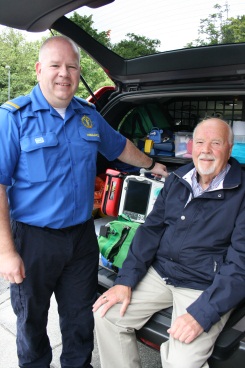6th July 2015
 Mr Ashe from Bangor paid an emotional visit to Bangor ambulance station to Paramedic Neil Blackmore who played a major role in saving his life.
Mr Ashe from Bangor paid an emotional visit to Bangor ambulance station to Paramedic Neil Blackmore who played a major role in saving his life.
On Jan 1st this year, Mr Ashe had just returned to his own home after a bit of house sitting in Donaghadee. As he was unpacking, he just felt that something wasn’t quite right and he phoned his son, who lives in the apartment downstairs. “I told him – you’d better get up here”
When his son came up, he found his father in a bit of distress and they decided to phone for an ambulance. Ambulance control sent Rapid Response Paramedic, Neil Blackmore to the scene.
Mr Ashe takes up the story,
“I remember the medic putting the leads on my chest and taking a tracing of my heart. It was then I felt myself slipping away and I told him –I’m going out here! The next thing I remember was coming round and then an ambulance crew arriving and taking me to the Royal. They took me into theatre, knocked me out and when I came round I was on the ward with stents having been put in. I stayed in the Royal for four or five days and was then transferred to the Ulster Hospital for another few days.
I just wanted to come and say thanks to the ambulance crews because my consultant told me that I am only here because the paramedic knew his stuff. I am so grateful to him and also to the doctors and nurses in the hospitals. Today I’m a bit wary about my health but I know it will get better as time goes on.”
Paramedic Neil Blackmore remembers the call well, it being his first Cardiac Arrest of the New Year.
“When I arrived I took a tracing and sent it to the Royal with the intention of taking Mr Ashe straight in for pPCI. While I was waiting for their okay, Mr Ashe went into VF arrest. I gave him one shock with the defibrillator and that combined with a cycle of CPR was enough to resuscitate him. Even more so, time was now of the essence. Mr Ashe was taken to the pPCI lab at the RVH and had stents inserted to clear his coronary arteries”.
This story is a stand-out example of how Healthcare in Northern Ireland has developed over the years and is providing greater benefits to the patient. Many paramedics will recall how in time gone by, they would have been faced with a wait at the scene while the cardiac team arrived from the hospital. This situation improved when Paramedics were trained to deliver Streptokinase before taking the patient to the ED. Now, with the right initial care and direct access to pPCI, many patients are finding they are able to leave hospital after a heart attack within days to resume normal living – albeit with a bit more care.
